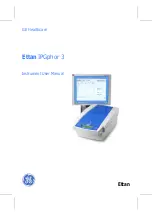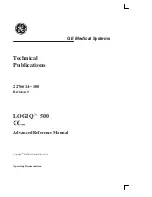
CIRRUS HD-OCT User Manual
2660021169012 Rev. A 2017-12
Posterior Segment
8-31
RNFL Data Table
The data table reports average thickness around the RNFL calculation circle. It also reports
a percentage calculation of thickness Symmetry between the eyes. The color associated
with each measurement derives from comparison to the age-matched RNFL normative
data. The symmetry parameter is the correlation coefficient, converted to a percentage,
that results from comparing the OD profile (256 points) with the OS profile (256 points).
Normative data was collected for both eyes and the normal limits for this symmetry
parameter were determined.
When the symmetry parameter is close to 100%, the two eyes have similar profiles. As one
profile becomes different from the other, the reported symmetry value decreases. If there is
no relationship between the two eyes, the symmetry approaches 0%. It is possible for the
symmetry to report a value below zero if the two profiles are very different, but this is rare.
The data table also reports optic disc parameters as described previously.
RNFL and ONH Normative Databases
For completeness, please refer to "
RNFL and ONH Normative Databases" on page
for an explanation of the application of the RNFL Normative Database to these
elements.
Advanced Export
Click on the Advanced Export button
on the ONH
AND
RNFL OU A
NALYSIS
screen, to
export and store ILM-RNFL thickness maps as .DAT files and .txt files of Neuro-retinal Rim
Thickness and RNFL Thickness profiles to a user-selectable directory. See "
for a complete description of this function.
Guided Progression Analysis
Guided Progression Analysis (GPA™) is provided for two analyses:
• RNFL & ONH
• Ganglion Cell
GPA compares thickness measurements over time and determines if statistically significant
change has occurred. GPA allows the user to analyze information from 3 to 8 exams.
GPA includes a chronological display of thickness maps and thickness change maps,
average thickness graphs representing rate of change, and thickness profiles comparing
the current exam to the baseline exams. Statistically significant changes are summarized
with flags for possible or likely thickness loss (or possible thickness increase). The layout of
these elements within the GPA window is shown in
and
RNFL
Summary
Data
Summary of Contents for CIRRUS HD-OCT 500
Page 1: ...2660021156446 B2660021156446 B CIRRUS HD OCT User Manual Models 500 5000 ...
Page 32: ...User Documentation 2660021169012 Rev A 2017 12 CIRRUS HD OCT User Manual 2 6 ...
Page 44: ...Software 2660021169012 Rev A 2017 12 CIRRUS HD OCT User Manual 3 12 ...
Page 58: ...User Login Logout 2660021169012 Rev A 2017 12 CIRRUS HD OCT User Manual 4 14 ...
Page 72: ...Patient Preparation 2660021169012 Rev A 2017 12 CIRRUS HD OCT User Manual 5 14 ...
Page 110: ...Tracking and Repeat Scans 2660021169012 Rev A 2017 12 CIRRUS HD OCT User Manual 6 38 ...
Page 122: ...Criteria for Image Acceptance 2660021169012 Rev A 2017 12 CIRRUS HD OCT User Manual 7 12 ...
Page 222: ...Overview 2660021169012 Rev A 2017 12 CIRRUS HD OCT User Manual 9 28 ...
Page 256: ...Log Files 2660021169012 Rev A 2017 12 CIRRUS HD OCT User Manual 11 18 ...
Page 308: ...Appendix 2660021169012 Rev A 2017 12 CIRRUS HD OCT User Manual A 34 ...
Page 350: ...CIRRUS HD OCT User Manual 2660021169012 Rev A 2017 12 I 8 ...
Page 351: ...CIRRUS HD OCT User Manual 2660021169012 Rev A 2017 12 ...
















































